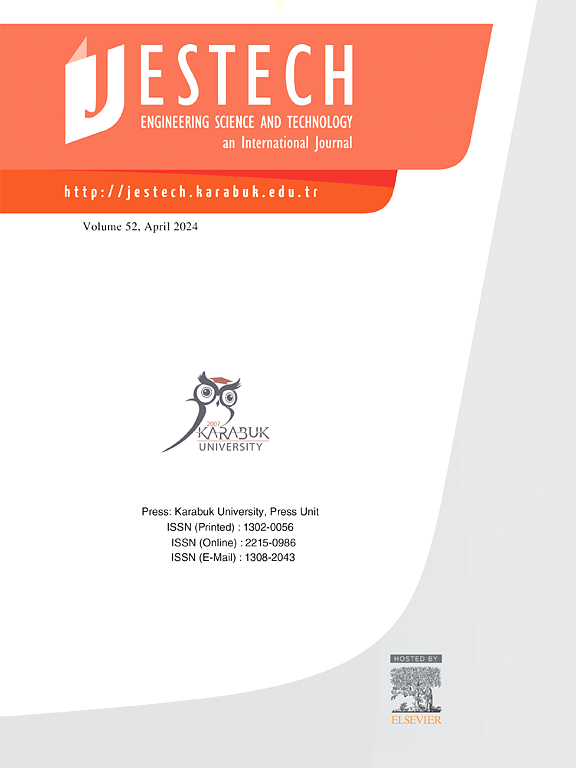Research on weakly conservative passive fault-tolerant control method considering the fault distribution
IF 5.1
2区 工程技术
Q1 ENGINEERING, MULTIDISCIPLINARY
Engineering Science and Technology-An International Journal-Jestech
Pub Date : 2025-01-01
DOI:10.1016/j.jestch.2025.101948
引用次数: 0
Abstract
This study proposes a weakly conservative passive fault-tolerant control method that considers the fault distribution. The concept of weakly conservative passive fault-tolerant control is introduced initially. For fault parameter uncertainty domains with low probability, the constraints of control design are relaxed to expand the feasible domain of passive fault-tolerant controller parameters. The aim of weakly conservative passive fault-tolerant control is to find the optimal controller in the passive fault-tolerant controller parameter feasible domain. Moreover, a weakly conservative passive fault-tolerant control method is designed based on guaranteed robust cost control. Compared to the fault parameter uncertainty domain with high probability, the corresponding upper limit constraint of the performance index is increased for the fault parameter uncertainty domain with low probability. Furthermore, a larger feasible domain of passive fault-tolerant controller parameters is structured. A weakly conservative passive fault-tolerant controller based on guaranteed robust cost control is derived from the feasible domain of the passive fault-tolerant controller parameter. The proposed method overcomes the strong conservatism of passive fault-tolerant control and has practical application value. The simulation results on a boost DC-DC converter validate the effectiveness of the proposed method.
求助全文
约1分钟内获得全文
求助全文
来源期刊

Engineering Science and Technology-An International Journal-Jestech
Materials Science-Electronic, Optical and Magnetic Materials
CiteScore
11.20
自引率
3.50%
发文量
153
审稿时长
22 days
期刊介绍:
Engineering Science and Technology, an International Journal (JESTECH) (formerly Technology), a peer-reviewed quarterly engineering journal, publishes both theoretical and experimental high quality papers of permanent interest, not previously published in journals, in the field of engineering and applied science which aims to promote the theory and practice of technology and engineering. In addition to peer-reviewed original research papers, the Editorial Board welcomes original research reports, state-of-the-art reviews and communications in the broadly defined field of engineering science and technology.
The scope of JESTECH includes a wide spectrum of subjects including:
-Electrical/Electronics and Computer Engineering (Biomedical Engineering and Instrumentation; Coding, Cryptography, and Information Protection; Communications, Networks, Mobile Computing and Distributed Systems; Compilers and Operating Systems; Computer Architecture, Parallel Processing, and Dependability; Computer Vision and Robotics; Control Theory; Electromagnetic Waves, Microwave Techniques and Antennas; Embedded Systems; Integrated Circuits, VLSI Design, Testing, and CAD; Microelectromechanical Systems; Microelectronics, and Electronic Devices and Circuits; Power, Energy and Energy Conversion Systems; Signal, Image, and Speech Processing)
-Mechanical and Civil Engineering (Automotive Technologies; Biomechanics; Construction Materials; Design and Manufacturing; Dynamics and Control; Energy Generation, Utilization, Conversion, and Storage; Fluid Mechanics and Hydraulics; Heat and Mass Transfer; Micro-Nano Sciences; Renewable and Sustainable Energy Technologies; Robotics and Mechatronics; Solid Mechanics and Structure; Thermal Sciences)
-Metallurgical and Materials Engineering (Advanced Materials Science; Biomaterials; Ceramic and Inorgnanic Materials; Electronic-Magnetic Materials; Energy and Environment; Materials Characterizastion; Metallurgy; Polymers and Nanocomposites)
 求助内容:
求助内容: 应助结果提醒方式:
应助结果提醒方式:


